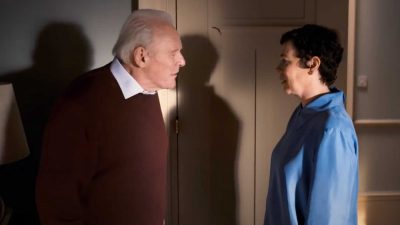

It is perhaps the strangest then, that the most successful stage-to-screen adaptation this season is from a first-time director, a playwright who is actually making their directorial debut. Florian Zeller is a French playwright who has had three of his films adapted for the screen, all of them in French, but he has never directed any of his own play adaptations until now, with The Father, starring Anthony Hopkins and Olivia Colman. So not only is Zeller contending with making a film in English instead of French for the first time, but he’s also learning on the job how to tell a story that was designed to be told in one closed location in a way that doesn’t make the film audience feel restricted. While all of the other stage-to-screen films this season have struggled with this expansion of their world (with the exception of The Prom, which had other problems), The Father cracked the code, as Zeller has delivered not only the best film adaptations of the season, but one of the most effective, moving and, dare I say, cinematic films of the year.
making their directorial debut. Florian Zeller is a French playwright who has had three of his films adapted for the screen, all of them in French, but he has never directed any of his own play adaptations until now, with The Father, starring Anthony Hopkins and Olivia Colman. So not only is Zeller contending with making a film in English instead of French for the first time, but he’s also learning on the job how to tell a story that was designed to be told in one closed location in a way that doesn’t make the film audience feel restricted. While all of the other stage-to-screen films this season have struggled with this expansion of their world (with the exception of The Prom, which had other problems), The Father cracked the code, as Zeller has delivered not only the best film adaptations of the season, but one of the most effective, moving and, dare I say, cinematic films of the year.
Zeller deserves only part of the credit, however, as The Father is a film built around a single performance, and the performance delivered by Hopkins is one that would define a career for any lesser performer. The legendary 83-year old Oscar-winner has enjoyed a successful 54-year career and every bit of his professional mastery is on display in his performance as Anthony, a man struggling with dementia. His performance is an absolute tour-de-force, a master class in acting, as Hopkins navigates the ebb and flow of sanity, hitting every single right tone as a man who alternates between raging against the light and flickering away into darkness. His alternating subtlety and bravado are magnificently calibrated, and the underlying sorrow and desperation are palpable. Co-starring fellow Oscar winner Olivia Colman as Anthony’s daughter, Anne, The Father could be one of those films where you’d be happy to just sit back and watch this pair of talented actors engage with one another, but the film finds a way to present a fully-immersive experience with the unendingly brilliant pair of performances as merely the highlight of the journey.
The story itself is pretty straightforward, as we watch Anthony desperately trying to maintain control of his life and mind against his increasingly worsening dementia, and Anne reluctantly forced to consider putting him into assisted living. There have been quite a few films about dementia and Alzheimer’s this year, a subject that is painful and heart-wrenching, but the way Zeller portrays the disease is the most different and unique way I’ve seen. Using simple but effective cinematic techniques, Zeller puts the audience into Anthony’s mind, allowing us to see the world as he sees it. It is a most illuminating and effectively disorienting method of communicating the viciousness of dementia, and a person’s sense of helplessness in its midst.
But, again, all of Zeller’s clever techniques would be lost without the performances that carry both the weight and the depth of the film’s purpose. Colman is superb as the heartbroken daughter that is forced to come to terms with her father’s mental demise, as she finds every nuance in each emotion, but The Father wholly belongs to Hopkins, with a performance for the ages, one that will entertain you as much as it will wreck you. It’s not an easy film to watch, but worth every second.
